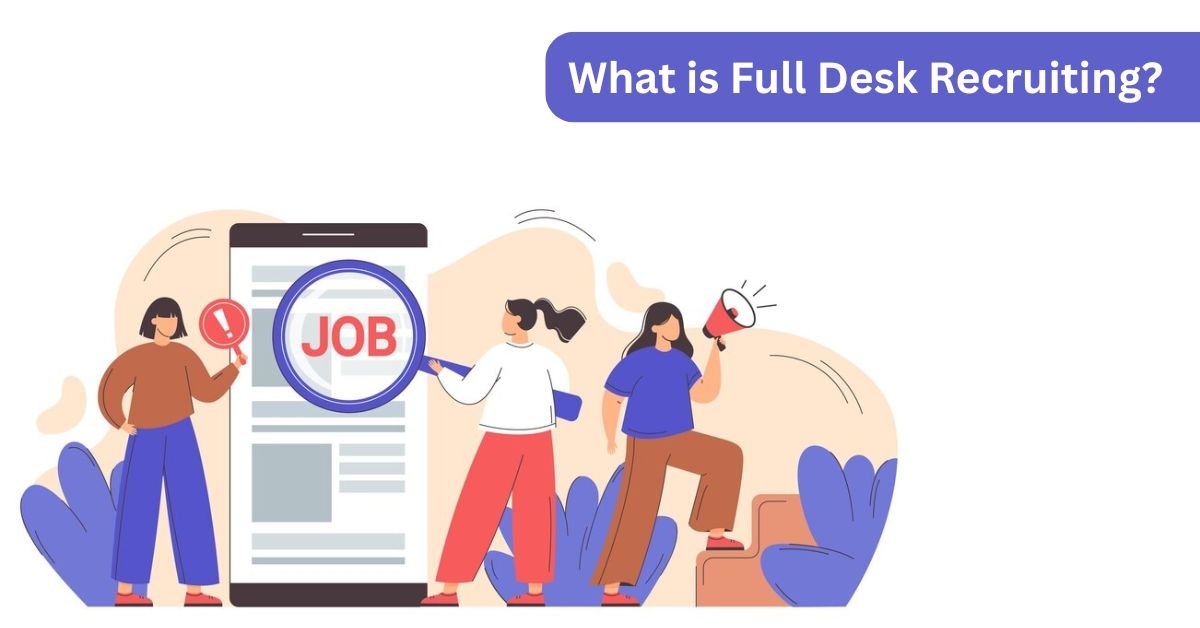What is Full Desk Recruiting?
Hiring the right people is one of the biggest challenges for any company. Businesses need skilled employees to grow, and finding the perfect candidates requires time and effort. This is where recruiters come in. There are different types of recruiters, and one of the most important roles in the recruitment industry is Full Desk Recruiting. We will explain everything about full desk recruiting in simple words. Whether you are a business owner, a job seeker, or someone interested in the recruitment industry, this guide will help you understand what full desk recruiting is, how it works, and why it is important.
What is Full Desk Recruiting?
Full desk recruiting means that a recruiter handles the entire hiring process from start to finish. This includes both finding clients (companies that need employees) and finding candidates (people looking for jobs).
In simple terms, a full desk recruiter plays a dual role:
- Business Development – They reach out to companies and offer recruiting services. They build relationships with businesses that need to hire employees.
- Talent Acquisition – They search for and connect with job seekers, helping them find jobs that match their skills.
This type of recruiting is different from split recruiting, where one recruiter focuses only on business development while another focuses only on hiring candidates. In full desk recruiting, one person does both tasks.
Responsibilities of a Full Desk Recruiter
Since a full desk recruiter handles both clients and candidates, they have many responsibilities, including:
1. Finding Clients
A full desk recruiter must find businesses that need employees. This process is called client acquisition. It involves:
- Calling and emailing companies
- Networking with business owners and HR managers
- Explaining recruitment services and benefits
- Negotiating contracts and fees
This step is important because recruiters earn money by placing candidates in jobs.
2. Understanding Job Requirements
Once a recruiter finds a client, they need to understand what kind of employees the company is looking for. This includes:
- Job title and responsibilities
- Required skills and experience
- Salary range and benefits
- Work culture and company values
Knowing these details helps the recruiter find the best candidates.
3. Sourcing Candidates
The next step is to find job seekers who fit the company’s needs. Recruiters use different methods to find candidates, such as:
- Job boards (Indeed, LinkedIn, etc.)
- Resume databases
- Social media
- Referrals from other candidates
- Direct outreach through emails and calls
This process requires strong networking skills and the ability to identify talented individuals.
4. Screening and Interviewing
Once recruiters find potential candidates, they need to evaluate them. This involves:
- Reviewing resumes
- Conducting phone or video interviews
- Testing skills (if required)
- Checking references
The goal is to make sure the candidate is a good fit before sending their profile to the company.
5. Submitting Candidates to Clients
After screening, the recruiter sends the best candidates to the client. They provide details such as:
- Resume and cover letter
- Interview notes
- Skills and experience summary
The client then reviews the profiles and decides which candidates to interview.
6. Scheduling Interviews
If the client is interested in a candidate, the recruiter arranges interviews. They coordinate between the company and the job seeker, ensuring both sides are available at the same time.
7. Helping with Job Offers
When the company selects a candidate, the recruiter helps with the job offer process. They:
- Negotiate salary and benefits
- Answer any questions from the candidate
- Ensure a smooth hiring process
8. Maintaining Relationships
A full desk recruiter doesn’t stop working after filling a job. They keep in touch with both the company and the employee to:
- Ensure a smooth onboarding process
- Solve any problems that arise
- Offer future recruitment services
Building strong relationships helps recruiters grow their business and get repeat clients.
Skills Needed for Full Desk Recruiting
Since full desk recruiters manage both sales (business development) and hiring (recruiting candidates), they need a variety of skills, including:
1. Communication Skills
A recruiter talks to many people daily, including business owners, hiring managers, and job seekers. Strong communication skills help in building trust and relationships.
2. Sales and Negotiation
Finding new clients and closing deals requires sales skills. Recruiters must be able to convince businesses to use their services.
3. Networking
The more connections a recruiter has, the easier it is to find job opportunities and talented candidates.
4. Time Management
Since recruiters juggle multiple tasks, they must be good at prioritizing and managing their time effectively.
5. Problem-Solving
Recruiting is not always smooth. Clients may change their requirements, candidates may decline job offers, and unexpected challenges can arise. A good recruiter must be able to handle these problems.
6. Knowledge of Hiring Trends
Recruiters should stay updated with industry trends, salary expectations, and hiring practices to provide the best service.
Why is Full Desk Recruiting Important?
Full desk recruiting benefits both companies and job seekers in many ways.
For Companies:
- They get a one-stop solution for their hiring needs.
- They work with a recruiter who understands their business and finds the right talent.
- The process is faster and more efficient.
For Job Seekers:
- They get access to job opportunities that are not publicly advertised.
- Recruiters help them improve their resumes and interview skills.
- They receive guidance throughout the hiring process.
For Recruiters:
- They have full control over their work.
- They can build long-term relationships with clients and candidates.
- They have the potential to earn high commissions by filling job positions.
Challenges of Full Desk Recruiting
Like any job, full desk recruiting comes with challenges:
- High Workload – Handling both client relationships and candidate searches can be time-consuming.
- Rejections – Some companies may not want to use recruitment services, and some candidates may not accept job offers.
- Competition – Many recruiters are in the market, making it important to stand out.
Despite these challenges, full desk recruiting is rewarding for those who are good at networking, problem-solving, and relationship-building.
Conclusion
Full desk recruiting is a complete recruitment approach where one person handles both finding clients and hiring candidates. It requires strong communication, sales, and networking skills.
This type of recruiting benefits companies by providing efficient hiring solutions and helps job seekers find great opportunities. While it comes with challenges, full desk recruiting can be a highly rewarding career for those who enjoy working with people and solving hiring problems.
If you are considering a career in recruitment or looking for a recruiter for your business, understanding full desk recruiting can help you make better decisions.
Frequently Asked Questions
What is full desk recruiting?
Full desk recruiting is when a recruiter handles both finding companies that need employees and hiring job seekers. They manage the entire process, from business development to candidate placement, ensuring that companies find the right employees and job seekers get suitable opportunities.
How is full desk recruiting different from split recruiting?
In full desk recruiting, one recruiter does both business development and talent acquisition. In split recruiting, one person finds clients while another finds candidates. Full desk recruiters manage the entire hiring process, making it more efficient but also more challenging.
What skills are needed for full desk recruiting?
Full desk recruiters need strong communication, sales, networking, problem-solving, and time management skills. They must also understand hiring trends, negotiate contracts, and build relationships with both companies and job seekers to succeed.
What are the benefits of full desk recruiting?
Full desk recruiting offers companies a one-stop hiring solution, helps job seekers find great opportunities, and allows recruiters to earn higher commissions. It also speeds up the hiring process and ensures that recruiters deeply understand both client needs and candidate qualifications.
What challenges do full desk recruiters face?
Full desk recruiters handle a high workload, face rejections from clients and candidates, and compete with many recruiters. Managing both sales and recruitment can be time-consuming, but strong networking, persistence, and problem-solving skills help overcome these challenges.



Great post! I really enjoyed reading this.